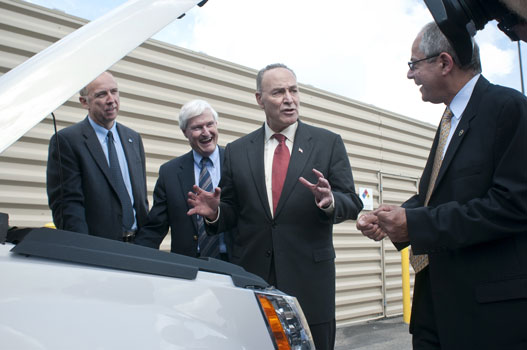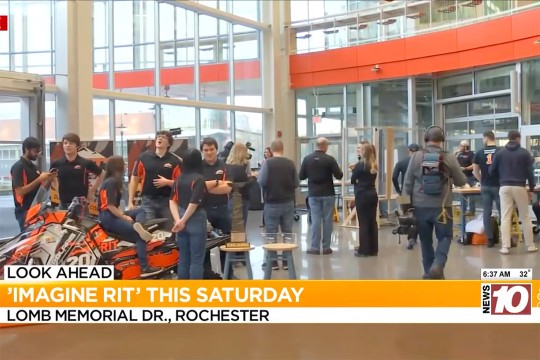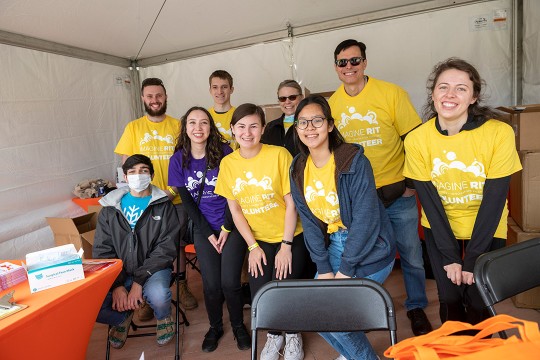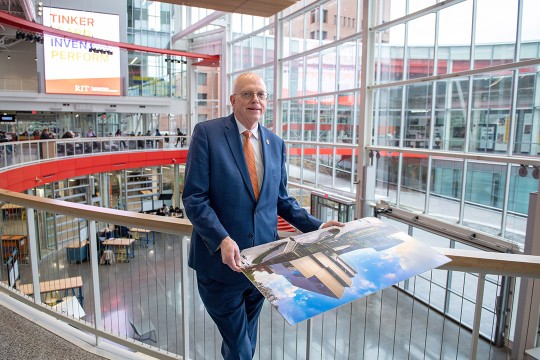Sen. Charles Schumer Calls for Restoration of Federal Fuel Cell Funding
During visit to RIT, Schumer promises to fight 20 percent cut in funding for research
Sen. Charles Schumer inspects a hydrogen fuel-cell vehicle during a June 21 visit to RIT. Schumer toured RIT's fuel-cell technology labs, test drove a GM hydrogen fuel cell vehicle and discussed the region's alternative energy research and economic development capacity with area business, academic and labor leaders. Shown above are (left to right) Daniel O'Connor, director of fuel cell commercialization at General Motors, RIT President Bill Destler, Sen. Schumer and Nabil Nasr, director of RIT's Golisano Institute for Sustainability.
U.S. Sen. Charles Schumer urged Congress to reverse a proposed 20 percent cut to the U.S. Department of Energy’s hydrogen fuel cell research program during an event June 21 at Rochester Institute of Technology.
Schumer toured RIT’s fuel-cell labs, visited its hydrogen fueling station and rode in a fuel-cell propelled car made start-to-finish in Rochester.
The combination of academic labs at RIT and the University of Rochester, along with local research facilities run by General Motors and Delphi, makes the Rochester region the leading fuel-cell location in North America, Schumer noted. He also said that fully funding the federal fuel-cell program would help secure the future of fuel cells in this country and ultimately provide the region with a huge economic boost.
Schumer was joined by RIT President Bill Destler, Daniel O’Connell, director of fuel cell commercialization at General Motors, and Daniel Maloney, president of the United Auto Workers Local 1097.
“Between General Motors, RIT, the University of Rochester and Delphi, Rochester has become the place to be for fuel cell research and development in this country,” Schumer said. “With the right investments, we can use what we’ve developed here to wean our country off of foreign oil and grow a local economic engine, but without the right investments it will be much more difficult.”
Noted Destler: “We are very honored that Sen. Schumer has chosen RIT to highlight the strategic national significance of fuel-cell technology. We believe that our region can be a national hub for fuel cell technology, thanks to an unparalleled cluster of academic and industry resources and expertise working together to advance research, development and commercialization in the field.”
The federal government funds hydrogen and fuel cell research through a Department of Energy initiative called the Fuel Cell Technologies Program. It has been targeted by the administration for a reduction of $37 million, 20 percent of the entire program, for fiscal year 2011.
Schumer and several Senate colleagues have asked the Senate Appropriations Subcommittee on Energy and Water Development to not abide by the administration’s recommendations and restore full funding to the fuel-cell program. The subcommittee is the ultimate arbiter of the Department of Energy’s budget.
Schumer said that the fuel-cell industry is just beginning to achieve its promise and could ultimately create thousands of jobs locally and hundreds of thousands across the country. A growing fuel-cell industry also means growth in manufacturing across the supply chain, sales, service and related fields. Studies by the U.S. Fuel Cell Council, the Department of Energy and the private sector project that up to 700,000 new jobs are possible in the fuel cell industry in the next 10 to 20 years.
“No one denies that we need to cut our dependence on foreign oil,” Schumer continued. “So cutting a program that has so much potential, particularly for Rochester, would do incredible harm.”















